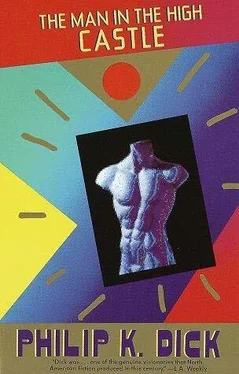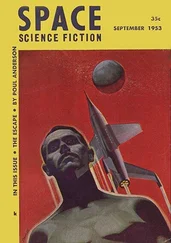And who is Mama for them? she wondered. The leader, Herr Bormann, who is supposed to be dying? Or—the Sick One.
Old Adolf, supposed to be in a sanitarium somewhere, living out his life of senile paresis. Syphilis of the brain, dating back to his poor days as a bum in Vienna… long black coat, dirty underwear, flophouses.
Obviously, it was God’s sardonic vengeance, right out of some silent movie. That awful man struck down by an internal filth, the historic plague for man’s wickedness.
And the horrible part was that the present-day German Empire was a product of that brain. First a political party, then a nation, then half the world. And the Nazis themselves had diagnosed it, identified it; that quack herbal medicine man who had treated Hitler, that Dr. Morell who had dosed Hitler with a patent medicine called Dr. Koester’s Antigas Pills—he had originally been a specialist in venereal disease. The entire world knew it, and yet the Leader’s gabble was still sacred, still Holy Writ. The views had infected a civilization by now, and, like evil spores, the blind blond Nazi queens were swishing out from Earth to the other planets, spreading the contamination.
What you get for incest: madness, blindness, death.
Brrr. She shook herself.
“Charley,” she called to the fry cook. “You about ready with my order?” She felt absolutely alone; getting to her feet she walked to the counter and seated herself by the register.
No one noticed her except the young Italian truck driver; his dark eyes were fixed on her. Joe, his name was. Joe what? she wondered.
Closer to him, now, she saw that he was not as young as she had thought. Hard to tell; the intensity all around him disturbed her judgment. Continually he drew his hand through his hair, combing it back with crooked, rigid fingers. There’s something special about this man, she thought. He breathes—death. It upset her, and yet attracted her. Now the older truck driver inclined his head and whispered to him. Then they both scrutinized her, this time with a look that was not the ordinary male interest.
“Miss,” the older one said. Both men were quite tense, now. “Do you know what this is?” He held up a flat white box, not too large.
“Yes,” Juliana said. “Nylon stockings. Synthetic fiber made only by the great cartel in New York, I. G. Farben. Very rare and expensive.”
“You got to hand it to the Germans; monopoly’s not a bad idea.” The older truck driver passed the box to his companion, who pushed it with his elbow along the counter toward her.
“You have a car?” the young Italian asked her, sipping his coffee.
From the kitchen, Charley appeared; he had her plate.
“You could drive me to this place.” The wild, strong eyes still studied her, and she became increasingly nervous, and yet increasingly transfixed. “This motel, or wherever I’m supposed to stay tonight. Isn’t that so?”
“Yes,” she said. “I have a car. An old Studebaker.”
The fry cook glanced from her to the young truck driver, and then set her plate before her at the counter.
The loudspeaker at the end of the aisle said, “ Achtung, meine Damen und Herren .” In his seat, Mr. Baynes started, opened his eyes. Through the window to his right he could see, far below, the brown and green of land, and then blue. The Pacific. The rocket, he realized, had begun its long slow descent.
In German first, then Japanese, and at last English, the loudspeaker explained that no one was to smoke or to untie himself from his padded seat. The descent, it explained, would take eight minutes.
The retro-jets started then, so suddenly and loudly, shaking the ship so violently, that a number of passengers gasped. Mr. Baynes smiled, and in the aisle seat across from him, another passenger, a younger man with close-cropped blond hair, also smiled.
“Sie furchten dass—” the young man began, but Mr. Baynes said at once, in English:
“I’m sorry; I don’t speak German.” The young German gazed at him questioningly, and so he said the same thing in German.
“No German?” the young German said, amazed, in accented English.
“I am Swedish,” Baynes said.
“You embarked at Tempelhof.”
“Yes, I was in Germany on business. My business carries me to a number of countries.”
Clearly, the young German could not believe that anyone in the modern world, anyone who had international business dealings and rode—could afford to ride—on the latest Lufthansa rocket, could or would not speak German. To Baynes he said, “What line are you in, mein Herr?”
“Plastics. Polyesters. Resins. Ersatz—industrial uses. Do you see? No consumers’ commodities.”
“Sweden has a plastics industry?” Disbelief.
“Yes, a very good one. If you will give me your name I will have a firm brochure mailed to you.” Mr. Baynes brought out his pen and pad.
“Never mind. It would be wasted on me. I am an artist, not a commercial man. No offense. Possibly you have seen my work while on the Continent. Alex Lotze.” He waited.
“Afraid I do not care for modern art,” Mr. Baynes said. “I like the old prewar cubists and abstractionists. I like a picture to mean something, not merely to represent the ideal.” He turned away.
“But that’s the task of art,” Lotze said. “To advance the spirituality of man, over the sensual. Your abstract art represented a period of spiritual decadence, of spiritual chaos, due to the disintegration of society, the old plutocracy. The Jewish and capitalist millionaires, the international set that supported the decadent art. Those times are over; art has to—go on—it can’t stay still.”
Baynes nodded, gazing out the window.
“Have you been to the Pacific before?” Lotze asked.
“Several times.”
“Not I. There is an exhibition in San Francisco of my work, arranged by Dr. Goebbels’ office, with the Japanese authorities. A cultural exchange to promote understanding and goodwill. We must ease tensions between the East and West, don’t you think? We must have more communication, and art can do that.”
Baynes nodded. Below, beyond the ring of fire from the rocket, the city of San Francisco and the Bay could now be seen.
“Where does one eat in San Francisco?” Lotze was saying. “I have reservations at the Palace Hotel, but my understanding is that one can find good food in the international section, such as the Chinatown.”
“True,” Baynes said.
“Are prices high in San Francisco? I am out of pocket for this trip. The Ministry is very frugal.” Lotze laughed.
“Depends on the exchange rate you can manage. I presume you’re carrying Reichsbank drafts. I suggest you go to the Bank of Tokyo on Samson Street and exchange there.”
“ Danke sehr ,” Lotze said. “I would have done it at the hotel.”
The rocket had almost reached the ground. Now Baynes could see the airfield itself, hangars, parking lots, the autobahn from the city, the houses… very lovely view, he thought. Mountains and water, and a few bits of fog drifting in at the Golden Gate.
“What is that enormous structure below?” Lotze asked. “It is half-finished, open at one side. A spaceport? The Nipponese have no spacecraft, I thought.”
With a smile, Baynes said, “That’s Golden Poppy Stadium. The baseball park.”
Lotze laughed. “Yes, they love baseball. Incredible. They have begun work on that great structure for a pastime, an idle time-wasting sport—”
Interrupting, Baynes said, “It is finished. That’s its permanent shape. Open on one side. A new architectural design. They are very proud of it.”
“It looks,” Lotze said, gazing down, “as if it was designed by a Jew.”
Читать дальше










